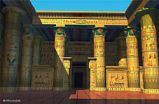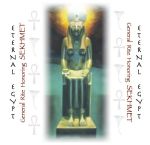1. Realize that you are engaged in a great work—helping to reestablish ma'at. You may find resistance from unexpected quarters, including your own mind, family, and friends. The forces of isfet (disorder and un-creation) are many and will fight against your efforts in various ways. Be alert. Be vigilant, for those powers will whisper to you that you work and struggle in vain. Don't believe it. As long as your intent is good, the gods are on your side.
2. Pace yourself. Don't try to undertake too many things at once.
3. Get organized! Make a little plan. Perhaps it will be to speak to your pagan friends and see if any are interested in your project. Don't let disappointment take away your enthusiasm. Persist!
4. Advertise your intent. Perhaps you can start with a discussion group, or a presentation about ancient Egyptian religion. Try not to attempt to cover too wide a subject. Focus on what you think a newcomer might like to learn about a few of the gods, or a few of the myths, or the reasons that brought you to Kemetic worship in the first place. Keep it simple. Encourage questions and differences of opinion. Advertise locally—fliers, announcements at other pagan events (ask permission first). A local cafe is a good place to meet on neutral ground.
5. Select just one book for others to read. At first, you can copy a chapter from a book and use it spur discussion. Then, if attendees want to purchase a copy, try ordering used copies online. Even new copies typically cost less than twenty dollars. I suggest starting with Temple of the Cosmos, by Jeremy Naydler. It is written for easy reading, has lots of illustrations, and, most important, it covers a full range of topics in the religion of ancient Egypt. It's best not to overwhelm folks with a highly academic book. Many people may not care to wade through the very analytical and detailed books of scholars. They enjoy a book of substance, but not necessarily one produced for academics.
6. Realize it may take several years to gather just a few people for the new temple.
7. Be sure your meetings/presentations/discussions are safe space for others to express their opinions without fear. An authoritarian approach may well alienate people. All of us, including the founders of temples, are growing in knowledge and understanding. So be kind in your replies and make sure no one else assumes a know-it-all posture in your group.
8. Do not jump quickly into inviting people to ritual. Ancient Egyptian ritual requires real familiarity with the elements of the ritual, the meaning of ritual actions and ritual recitations. My book, Eternal Egypt, provides both explanation and many examples of rituals from ancient Egypt. Make sure that you have become familiar with the rituals in Eternal Egypt. I am happy to answer any questions you may have. Please feel free to write to me. Type the words Eternal Egypt in the Subject Field of your email.
9. Different people will experience the gods and goddesses in different ways. Some may start by just liking a picture or statue of a deity, or the mythic stories about Them. Try to build on their interest.
10. Avoid criticizing other groups—Kemetic, Wiccan, or otherwise. We are not gathering in order to feed feelings of superiority or resentment at the perceived failures of others.
11. Kemetic Reconstructionism is not based on UPG (Unverified Personal Gnosis). It is based on recovering the ancient rituals as handed down on papyrus and inscribed on temple walls. It does not include traditions or practices from African traditional religions such as Yoruba or African Diaspora religions in the Americas such as Vodou. Of course, we are aware that we no longer have the apparatus of the state-sponsored religion of ancient Egypt. But that does not mean that we cannot recover and revive the ancient rituals in as much as they still are extant.
12. Allow and even celebrate the fact that others may also have current interest in other spiritualities—Wicca, Ceremonial Magic, Shinto, etc. As the saying states, “There are many paths to the top of the mountain.” We are not fundamentalists who insist that there is only one way to the divine.
13. When it comes time to do your first group ritual (even if a group of two), prepare sufficiently beforehand so things do not feel rushed or slapdash.
14. Have everyone take an active part in the ritual, both with reciting the recitations as well as doing the ritual actions that accompany those recitations. Our Reconstructionist temples avoid titles such as high-priest, or lector-priest. Titles, we find, can lead to the temptation of self-aggrandizement. In ancient Egypt, with large, fully functioning temples, there needed to be an established hierarchy of responsibility. Today we no longer require it. Our temples are small. Each of us can share responsibilities for our ritual gatherings. We have found that this egalitarian approach avoids the pitfalls of hierarchy and positively encourages ownership in our temple work.
15. Ask others to contribute a portion of the food and beverage offerings for ritual. Then be sure to rotate the assignments on a regular basis so that each person gets to contribute an offering that will not needlessly duplicate what others are bringing. The food and beverage offerings revert to the participants at the conclusion of ritual. They make for a wonderful and healthy meal after ritual. During that meal time we discuss a section of a book or a topic of interest.
16. As your group grows in number, see if others can also host ritual in their homes. We rotate the location of ritual every month. It is important that members help clean up after ritual so the task does not fall on just the host.
17. Ask the gods to help you in your efforts. Your prayer may take a while to bear fruit, but you will find that it is worth every effort.
May the gods bless and inspire you in your work!
©2011 Richard Reidy
This material is copyrighted. All rights reserved.

I have received many inquiries from those who have read my book, Eternal Egypt, on how to start a temple in their area. Below you will find some suggestions based on many years of experience with establishing a number of local temples.
by Richard Reidy
Guidelines for Founding a New Temple
ARTICLES
Price : $15.00
The Kemetic Temple of San Jose is offering a CD of the General Ritual for Sekhmet recited by temple members and author Richard Reidy. This ritual is based on ancient temple texts & appears in Eternal Egypt: Ancient Rituals for the Modern World. The ritual is a beautiful, meditative journey into the heart of ancient worship. All proceeds from the CD go for temple expenses.
This beautiful CD costs $15 (price incl. shipping in the U.S.)
hear a sample

SEKHMET
Ritual Recording








For questions about Kemeticism, our Kemetic Temples, and Kemetic Reconstructionism,